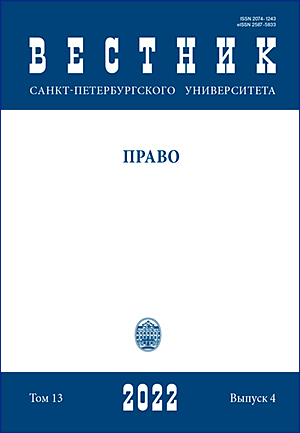Characteristic of legal communication: Addressees of legal acts
DOI:
https://doi.org/10.21638/spbu14.2022.401Abstract
While the communicative approach to the law is spread widely today, characteristic of legal communication are still purely described and weakly researched. Linguists and experts in theory of communication are not involved in discourse of legal notions and practice of law, whereas jurists are not ready to step out of this discourse. This article represents an attempt to overcome these difficulties and to find in law necessary parameters (focusing on the figure of addressee), being equipped with the methodology of communication theory. Resuming analysis of the substance and conditions of legal communication, the author concludes that recognized in the contemporary linguistic interaction model of communication with some limits are applied to the legal communication. Law does not suppose that content of legal acts (messages of legal communication) is determined solely by intention and will of addresser. Interpretation of legal acts is an important part of the mechanism of law and it needs active involvement of addressee, though unlike in communication of other types, the addressee cannot enjoy the full freedom of interpretation of text, aliened form the addresser. In law, this would raise a risk of violation the equal protection — fundamental principle of law. Addressees of legal acts are either executors or enforcers of legal prescriptions. Interpretation of enforcers tends to be coordinated and unified, leading to forming of collective enforcing addressee. Anyway, the execution of legal prescriptions is to be volitional and conscious, therefore the executors should keep the role of direct addressees as well, though their interpretation of legal acts will be subordinated to that of enforcers. The non-normative acts in the most cases (excluding non-reception one-sided deals and private applications to public authorities) have one main addressee, while the circle of potential addressees remains indefinite.
Keywords:
legal communication, addressee of communication, interpretation of legal acts, law-enforcement, equal protection principle, language of legal documents, intelligibility of legal acts, intelligibility of legal language, legal linguistics
Downloads
References
Downloads
Published
How to Cite
Issue
Section
License
Articles of "Vestnik of Saint Petersburg University. Law" are open access distributed under the terms of the License Agreement with Saint Petersburg State University, which permits to the authors unrestricted distribution and self-archiving free of charge.






